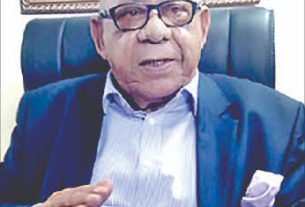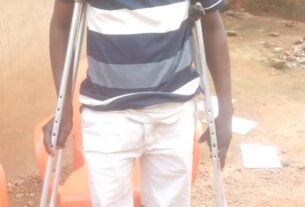By: Umunna Kalu
Mr. Olufemi Aduwo is the Permanent Representative of the Centre for Convention on Democratic Integrity (CCDI) to ECOSOC/United Nations and the Chairman of the CSO-African Countries Group of World Bank, Civil Society Policy Forum (CSPF). In this encounter, he speaks on insecurity in the country, 25 years of uninterrupted democracy, state police, among other national issues.
Excerpts:
It has been 25 years of democratic rule in Nigeria. What is your take on the journey so far?
Well, I don’t belong to the school of thought that the only quality upon which you need to run Nigeria state well is good leadership. The structure of a house is far more important than the interior decoration. A good house must be able to withstand inclement weather and the rigour of reasonable existence. It mustn’t be constantly under threat of collapse. We need a living constitution to settle all these anomalies we are witnessing. Thomas Paine, in his ‘Rights of Man’, 1789, which is generally acknowledged as valid stated; ‘A constitution has to be an original act of the people. The people do ordain and establish…it’s not a mere echo of revolutionary sentiment.’ It reflects a confirmation, that America’s Constitution obtains its entire existent force and efficacy from the people to be governed by it. That is why our constitution does not command the sacred obsession and is being violated with impunity by the people and government because it’s an imposition of military arrangement. Democracy usually survives not because politicians mean well but because people are strong and vigilant enough to protect their rights. They can only do so if they are informed of their environment and organised. Nigeria has suffered for years and may continue to suffer unless it rids itself of ill-equipped leadership. The leadership Nigeria has produced in the past 25 years leaves much to be desired Leadership cut across the political parties and arms of government not limited to the President. Modern governments are complex human organisations and therefore require men and women capable not only of intellectual penetration but also exhibit trust.
Political parties are a necessity in a democratic society. They are conduits through which people channel their wishes and demands. It’s not possible in modern times to have a democratic government without political parties. Even in Athenian (direct) democracy, there were group interests (parties). Some came from the valley and some came from the hills and at times their interests were varied. If l may ask, in the political crisis going on in Rivers State, why is the Peoples Democratic Party (PDP) national leaders mute and letting Governor Simi Fubara bear the heat alone, again that shows the kind of political parties we have, built around individual and not ideas. Election is the pillar of democratic representative government anywhere in the world. Because in a democracy the authority of the government derives solely from the consent of the governed, the principal mechanism for translating that consent into governmental authority is the holding of free and fair elections. All modern democracies hold elections, but not all elections are democratic. We have witnessed the bastardisation of the electoral process; since the journey started in 1999. Do Nigerians trust these leaders? Anyway, democracy is a journey and it also has inbuilt challenges. It’s a journey of no return since there’s no alternative to democracy.
.
What is your take on the security challenge in the country, do you think the military is overwhelmed?
The Insurgency cum terrorism war is long, don’t let us deceive ourselves. The Federal Ministry of Information and National Orientation Agency has a role to play. People must be informed and made to understand the difference between fighting terrorism, insurgency and civil war, enough of half-baked truth. It is well known that fighting insurgencies or terrorism are challenging. The war against the Taliban started in 1994. The Al-Qaeda notorious leader, Ayman al-Zawahri who coordinated the September 11, 2001 attacks on the United States that killed more than 3000 people, was killed in 2022 after many years he had been declared wanted by the United States government. As a people, we desperately need a more thoughtful discussion about our response to terrorism. People have had enough of the demagoguery and divisive partisan attacks that have dominated the debate over the years and obscure the issues. The basis of successful counter-terrorism is acquiring intelligence to identify an enemy that often hides among the populace. Counter-terrorism is the use of all elements of a nation’s power, including not only combined-arms operations but also psychological, political, economic, intelligence and diplomatic operations to defeat these confused criminals. What we’re witnessing across the North is predominantly uncoordinated criminal gangs engaging in terrorism. Both Boko Haram and lSWAP cannot overrun the central government of Nigeria, regardless of their links with foreign insurgency groups. We shouldn’t interpret Nigeria or every other jihadist Islamist group through the prism of what happened in Afghanistan. I disagree with the submission by some analysts, comparing the Nigerian situation with Somalia. The kinetics method only would not win the war, but a very important part. Asymmetric war operations pattern is far different from conventional war. The military is overstretched no doubt about that, in many states the military is engaged in common civil policing duties. The recent suicide bombing in parts of Borno State doesn’t warrant condemnation of military chiefs or being sanctioned as requested by a member of the House of Representatives. Failure is a collective responsibility of all of us. Years back the worship centres in the northern part were more vigilant regarding new faces in their midst and the vehicles around. Let’s admit we’re complacent and we should stop shifting blame. With the latest development in Borno State, the churches in the north and Abuja shouldn’t pray only but also watch.
Most Nigerians believe that only God-fearing leaders will take Nigeria out of the woods. How will you react to this view?
Do not forget that we have no aggregate perceptions of what fearing God is all about. Some of the most tyrannous human beings who have inflicted pain, sorrow and tears on humanity, have had no problems presenting themselves as God-fearing. Hitler was a mass server in the Catholic Church; Marcos went into a week retreat in a Jesuit chapel and then came out to declare martial law in his country. General Sani Abacha surrounded himself with prayer bands and did call for a national prayer a few weeks to his sudden death.
At the height of the Liberian war, Mr. Charles Taylor, the foremost rebel leader and who later became president, inflicted death and destruction on the people of Liberia, came to Nigeria and donated N1 million during offertory in a church in Abuja. All have been God fearing but as we move on in the democracy journey, the democratization process must go beyond setting up democratic structures.
Good government, not just liberal government must be insisted upon. Good governance must entail responsiveness, humanness, and human rights, pursuit of policies that address the concerns and the interests of the majority without trampling on the minority. Mandela, Awolowo, Aminu Kano, Obama and Clinton were God-fearing through their works, not by carrying the Bible or Quran.
What is your position on the continued debate over state police?
Nigeria gained independence from Britain in 1960, and its first constitution devolved substantial power to three regional governments, known as the Northern, Western, and Eastern regions. The federal government retained control of the Nigeria Police Force (NPF), but the regional governments continued to maintain their local police forces. The military government that emerged after two military coups in 1966 disbanded the local police forces amidst allegations that the local police had been used for partisan purposes by the regional governments against political opponents. One major glaring farcicality of Nigeria’s roll-up or twist of federal architecture is that of over-centralisation of powers and institutions. I doubt if there is another federal state in the world with power so concentrated at the centre as Nigeria. In the United States, the Federal Bureau of Investigation (FBI), for instance as federal police, investigates interstate crimes, among others. The state police enforce local laws and even supervise federal elections. The federal governments of Australia and Germany maintain police forces alongside the federating units. The constitution of Switzerland, Canada, India and Ethiopia empowers the federating units to share policing functions with the federal government. The relationships between all the police services are properly coordinated for the exchange of intelligence and the prevention of crimes. Nothing wrong with the creation of state police in Nigeria, but l foresee danger ahead due to the immaturity of many state governors. For example, governors who deployed armed thugs to attack the opposition during the election, having access to legal arms would chase away all the opposition. Nonetheless, with the strident calls for genuine fiscal federalism and power devolution, the call for the establishment of state police is apt now. Currently, no state in Nigeria is without an outfit resembling state police, only that some are not armed.








